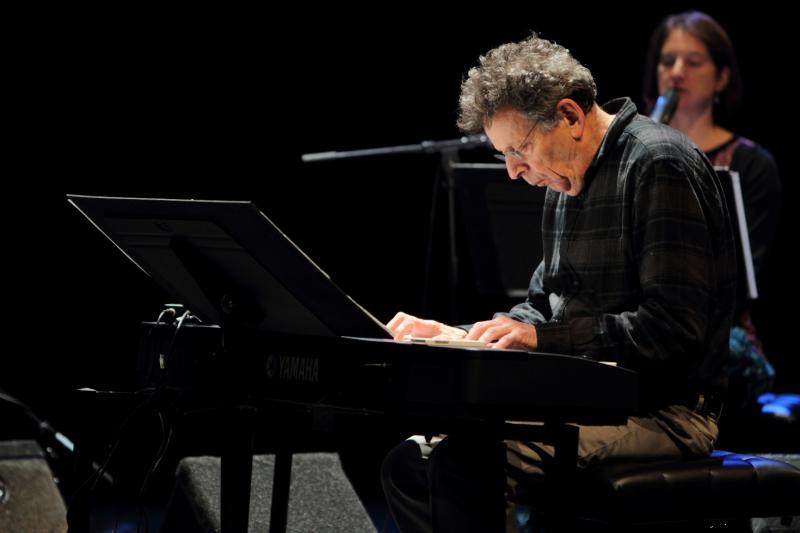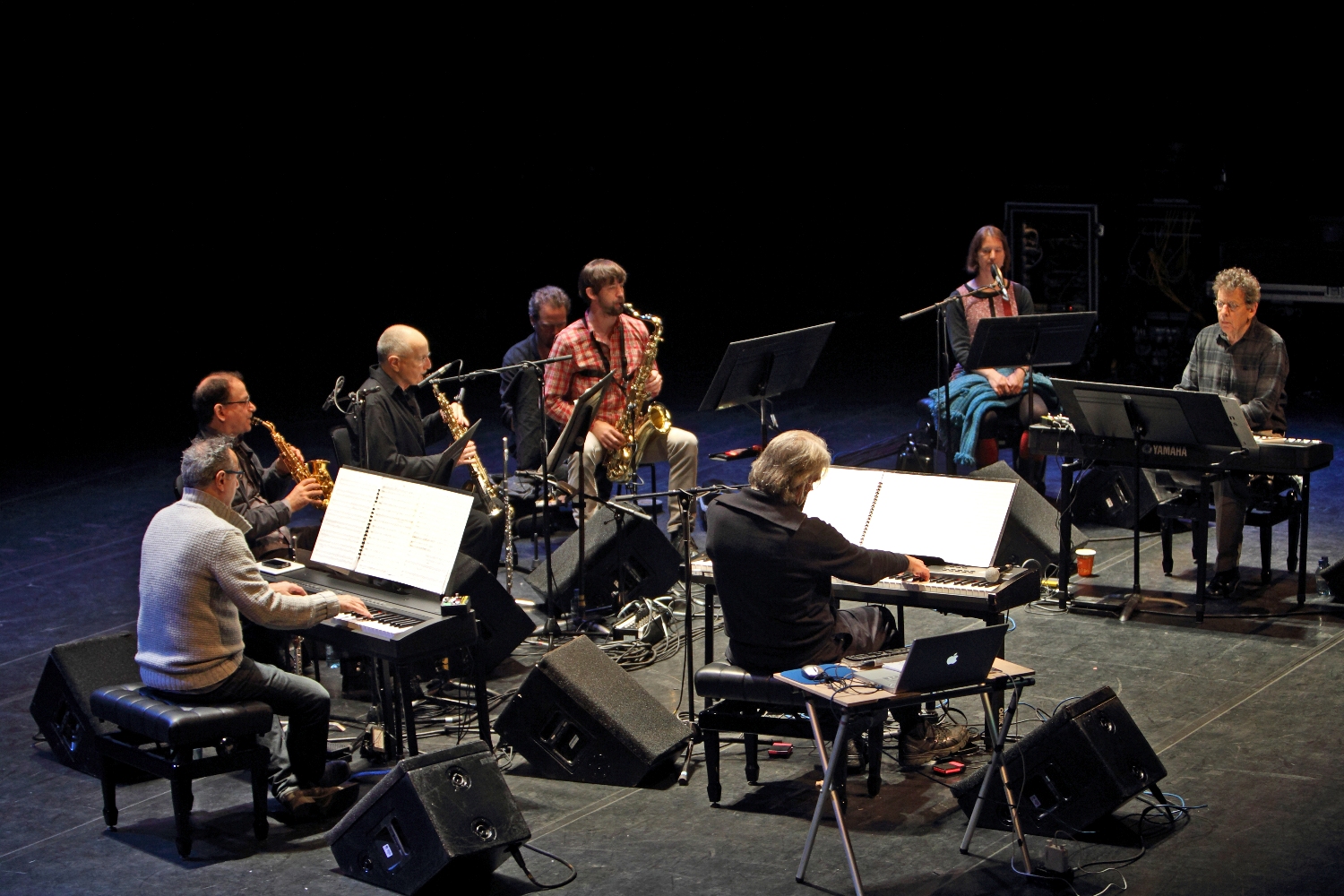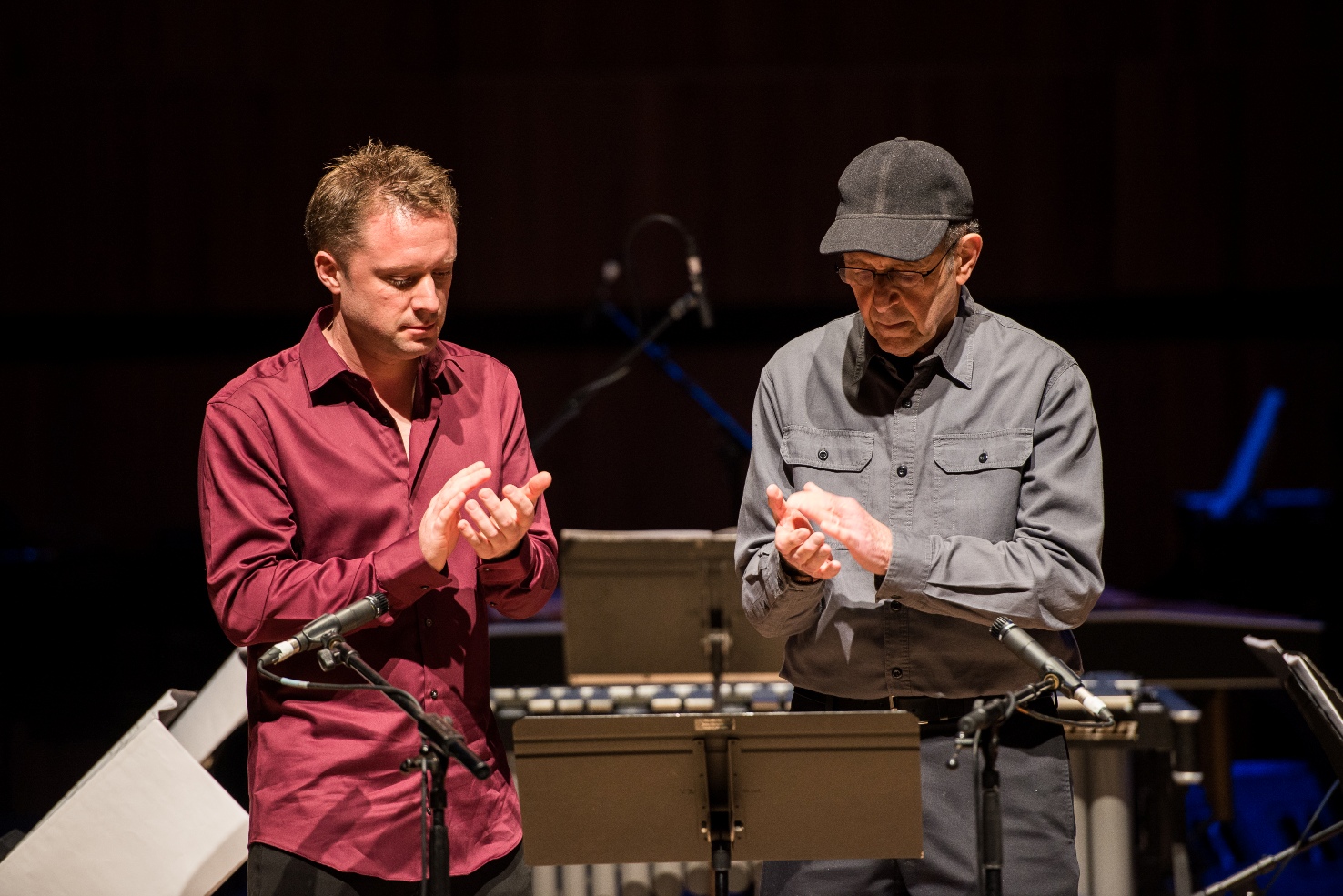Philip Glass/Steve Reich, Royal Festival Hall | reviews, news & interviews
Philip Glass/Steve Reich, Royal Festival Hall
Philip Glass/Steve Reich, Royal Festival Hall
Two Minimalist masterpieces presented by two Minimalist masters

The Southbank’s artistic director Jude Kelly was out in force at this penultimate weekend of The Rest is Noise festival, delivering little triumphalist, Ryan Air-like fanfares, reminding us how pioneering they had been to programme composers such as Igor Stravinsky, Richard Strauss, Benjamin Britten and Philip Glass - composers who no one had ever heard of before they'd bravely decided to put them on.
Contemporary or not, both Royal Festival Hall concerts this weekend were extraordinary. On Saturday came a rare performance of Philip Glass’s 1974 Music in 12 Parts, followed on Sunday by a performance of Steve Reich’s 1976 Music for 18 Musicians. Both composers were present.
Saturday’s performance of 12 Parts was headed by Glass himself. Leading the seven-member Philip Glass Ensemble from an electric keyboard, Glass conducted the subtle shifts in pulse and rhythm and the less subtle about-turns in harmony with dramatic, sweeping gestures of his head as if each downbeat might be his last.
If you were only familiar with Glass’s recent film and symphonic music, the strictness of the Minimalism on show might have surprised. 12 Parts is from the years when Minimalism was more sound art than music. And it’s one of great masterpieces of this radical early phase. It’s a work that redefines not only what music is but what listening might be about too. It is music as architecture: music to walk through and inhabit.
The listener bumps into the woozy start as if the music were there already. Even before this, however, the work was spreading seditious ideas, Michael Riesman opening the night with a distinctly un-classical, “A-one. A-two. A-one, two, three, four." It’s not what you expect to hear before four hours of avant-gardism.
It was instructive, however. It reminded that this is music that works by alchemising incongruous elements: traditional Indian techniques with the buzzy, brazen amplified sounds of the West; pop sensibilities with an avant-gardist earnestness; Romantic chromaticism and technical difficulty with postmodern cheek and flippancy. It creates a piece that is both profoundly familiar and yet completely alien.
Little orientalist riffs a piano beginner might stumble upon are built up through Glass's techniques of adding, subtracting and multiplying rhythms, tones and pulses into glorious temples of freshly patterned sound.

It wasn’t a perfect performance. I’m not sure that’s possible live. I’m not even sure that’s the aim. Like so much minimalism, the idea is as much part of the work as the work itself. Even when half the band dropped out (as they periodically did to catch their breath or regain control of their hand muscles) the soundworld continued on in our heads. There were only a few moments where technical exhaustion (the band includes two 70 year olds) affected the music, most noticeably in the celebrated transition from Part 4 to 5, which was a bit bungled. And I would have liked to hear the woodwinds a little more clearly.
Picking out a stand out performer would be quite wrong. The whole idea of 12 Parts is that it behaves like a Persian carpet, offering a dense interlocking weave to be viewed and admired as a whole. But certain sections certainly shone. The blazing Gamelan like ecstasy that was conjured up in Part 2. The choral hallucinations that wafted up from the tapestry of Part 4. Part 7 with its infectious big band tread.
But it’s the chromaticism of the final three parts that will stay with me. Glass would return to this soundworld briefly in the final act of Einstein on the Beach. After this, the riotous, perversely incorrect combination of styles of 12 Parts' last hour - an unlikely rapprochement between Minimalism and Expressionism - would never be taken further by Glass. A dead-end it may have been, but what a weird and fantastical dead end it was, the music rollercoastering through the music of the Middle East via late romanticism and Schoenberg’s twelve-tonism.
Next page: Steve Reich in person
It’s often thought Steve Reich was the more original of the two. The next night we got the chance to compare and contrast. The programme on Sunday included a selection of Reich’s most groundbreaking early works, including the tape piece Come Out (1966), Pendulum Music (1968) and Music for Pieces of Wood (1970).
We began, however, with Clapping Music (1972), Steve Reich polyrhythming with Colin Currie expertly (pictured below by Ben Larpent). It was much better than the last time I heard Reich perform the work at the Royal Festival Hall, when he forgot to cup his hands for maximum clap. Still, the amplified hand clap is a strange, messy sound, not unlike the flapping sound of a dying fish.
There is something musically perfect about the Reich's Music for 18 Musicians
Unlike Clapping Music, which I think works best on record, Come Out sounded fantastic live. It may only really work live. Pendulum Music, which Reich always saw as a musical joke, did exactly what it was meant to do. A laugh rang out as the four percussionists who’d just wowed us with a fantastically precise performance of Music for Pieces of Wood released the four microphones and left the stage, letting the mics duet with their speakers, feeding back in increasingly fascinating ways.
The performance of Music for 18 Musicians (1974-76) after the interval that saw the Colin Currie Group team up with Synergy Vocals was as fine a rendition of this work as you could hope for. Performers slipped and slid into and out of rhythm, conjuring up extraordinary musical crosshatching, using those famous Reichian swells to blow musical figures across the stage. Conductorless and fluid, it is a work where all must play their part, covering backs, swapping places, listening out for correct entries and exits. The ensemble were as attentive as I have ever seen a group of musicians.

The Glass was similarly democratic. It is an element of Minimalism that is often forgotten, the way that these compositions were a part of the great American democratizing project.
Listening to the piece in such proximity to the Glass it was hard not to make comparisons. The Glass seemed wilder than the Reich, the Reich more sophisticated and musical. Harmonic shifts in the Reich brought about certain epiphanies that were profoundly satisfying. That’s not to say Glass’s harmonic zig-zagging - reminiscent of Berlioz at his maddest - didn't have a lot going for it. It’s more inventive for one. But there is something musically perfect about the Reich work - certainly when played at the level it was Sunday.
Synergy Vocals were especially outstanding in delivering those tricky rhythmic calls, but everyone played their part. The harmonic doormen, the bass clarinets of Tim Lines and Dani Broncano, were superb. The heroes, however, were the percussionists, Currie, Catherine Ring, Adrian Spillett, Owen Gunnell, Adam Clifford and Richard Benjafield, who pulsed on xylophone and marimba in ever more attractive and mesmerising combinations.
rating
Share this article
Add comment
The future of Arts Journalism
You can stop theartsdesk.com closing!
We urgently need financing to survive. Our fundraising drive has thus far raised £49,000 but we need to reach £100,000 or we will be forced to close. Please contribute here: https://gofund.me/c3f6033d
And if you can forward this information to anyone who might assist, we’d be grateful.

Subscribe to theartsdesk.com
Thank you for continuing to read our work on theartsdesk.com. For unlimited access to every article in its entirety, including our archive of more than 15,000 pieces, we're asking for £5 per month or £40 per year. We feel it's a very good deal, and hope you do too.
To take a subscription now simply click here.
And if you're looking for that extra gift for a friend or family member, why not treat them to a theartsdesk.com gift subscription?

Comments
It's quite possible to
I read "out in force" as
I quite agree (though not